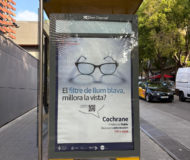

The outreach projects of the Iberoamerican Cochrane Centre (CCIb) will be visible on the streets of Barcelona during this Holy Week through a communication campaign aimed at bringing scientific health evidence closer to the public. The campaign, which began this past Tuesday, April 15, and will run through Monday, April 21, consists of a series of posters displayed in about ten bus shelters across the city. These posters pose general health-related questions designed to spark public curiosity.
Does listening to music help relieve insomnia? or Does intermittent fasting help with weight loss? are some questions featured on the posters. By scanning a QR code, interested individuals can access the answers and learn more about these and other health interventions. The campaign is supported by the Spanish Foundation for Science and Technology (FECYT) and the Organization of Consumers and Users (OCU), along with Hospital Sant Pau in Barcelona and the Sant Pau Research Institute (IR Sant Pau), with which the CCIb is affiliated.
“With this campaign, we aim to raise public awareness of our main outreach projects, such as Nutrimedia, Cochrane Responds, and Keys to Critical Thinking in Health, as well as invite interested citizens to participate in our studies to help improve science communication,” says Gonzalo Casino, Knowledge Transfer Manager at the CCIb.
Cochrane Responds is a monthly outreach project focused on the Cochrane systematic reviews that are of most interest to the public. The OCU has collaborated on this initiative since its launch in 2020. To date, over fifty health interventions have been featured in various formats, applying scientific evidence to communication efforts.
Nutrimedia, a joint project of the CCIb and Pompeu Fabra University in Barcelona, aims to provide citizens with scientific data and criteria to make informed decisions about nutrition and health. Its distinctive feature is that it evaluates how trustworthy certain health claims are—especially those circulating in the media and on social networks—while also answering questions submitted by the public.
Other projects featured in this campaign include Keys to Critical Thinking in Health and SimpleGRADE, which explains the certainty of evidence and the GRADE system in plain language.